When it comes to the logistics and transportation industry, the efficiency of semi-trailer trucks plays a pivotal role in ensuring timely deliveries and cost-effective operations. One critical aspect that directly impacts both the operational costs and the sustainability of these heavy-duty vehicles is fuel capacity. At CarMax Vehicle, we understand the intricacies involved in designing and manufacturing semi-trailer trucks, including optimizing fuel capacity to meet diverse transportation needs.
The Importance of Fuel Capacity in Semi-Tankers
Fuel capacity in semi-tankers is not merely a specification; it’s a strategic component that influences:
- Operational Range: Determines how far a truck can travel before refueling.
- Cost Efficiency: Impacts the frequency of refueling stops and overall fuel expenses.
- Load Optimization: Balances the carrying capacity with the weight of fuel to maximize payload.
- Environmental Impact: Influences fuel consumption patterns and emissions.
Understanding these factors is crucial for fleet managers and operators aiming to optimize their logistics operations.
Typical Fuel Capacities in Semi-Tankers
Semi-tankers come in various configurations, each tailored to specific transportation needs. The fuel capacity can vary based on factors such as the size of the trailer, the type of fuel used, and regulatory requirements. Here’s a breakdown of common fuel capacities:
| Trailer Type | Fuel Capacity Range | Typical Use Cases |
|---|---|---|
| Standard Dry Van | 100-200 gallons | General freight transportation |
| Refrigerated Trailer | 150-300 gallons | Perishable goods and temperature-sensitive items |
| Flatbed Trailer | 100-250 gallons | Construction materials and oversized loads |
| Tanker Trailer | 200-400 gallons | Liquid transport, including chemicals and fuels |
At CarMax Vehicle, our semi-trailer designs accommodate varying fuel capacities to meet the specific demands of different industries, ensuring both versatility and efficiency.

Factors Influencing Fuel Capacity
Several factors dictate the fuel capacity of a semi-tanker, each contributing to the overall performance and suitability of the vehicle for particular tasks:
1. Trailer Size and Design
The physical dimensions of the trailer play a significant role in determining fuel capacity. Larger trailers can accommodate bigger fuel tanks, allowing for longer ranges between refueling. However, this must be balanced against the vehicle’s overall weight and payload capacity.
2. Type of Fuel Stored
Different types of fuels require different storage solutions. For example:
- Diesel Fuel: Commonly used in semi-trucks, diesel tanks need to be robust and resistant to various environmental factors.
- Alternative Fuels: With the rise of sustainable energy, some semi-trailers are designed to store biofuels or hydrogen, each necessitating specialized tank designs.

3. Regulatory Compliance
Fuel storage in semi-trailers is subject to stringent regulations to ensure safety and environmental protection. Compliance with standards set by organizations such as the Department of Transportation (DOT) and the Environmental Protection Agency (EPA) is crucial. These regulations can influence the maximum allowable fuel capacity and the design of fuel storage systems.
4. Weight Considerations
Fuel adds significant weight to a semi-trailer, impacting payload capacity and fuel efficiency. Designers must carefully balance fuel capacity with the need to maximize the load carried, ensuring that the trailer remains within legal weight limits.
Maximizing Fuel Efficiency
Effective management of fuel capacity is essential for enhancing fuel efficiency and reducing operational costs. Here are strategies employed by CarMax Trailer to optimize fuel usage:
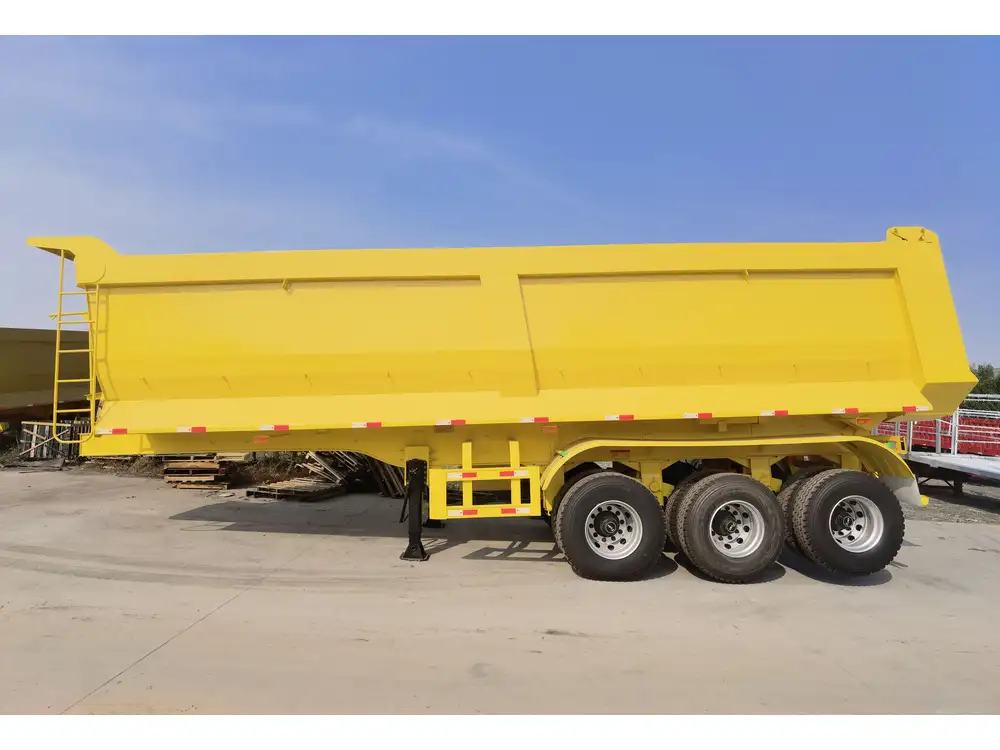
Advanced Aerodynamics
Streamlined designs reduce air resistance, allowing trucks to consume less fuel over long distances. Our trailers are engineered with aerodynamic features such as tapered fronts and side skirts to minimize drag.
Efficient Engine Performance
Pairing high-capacity trailers with fuel-efficient engines ensures that fuel consumption is optimized. Modern engines with advanced fuel injection systems and electronic controls contribute to better fuel management.
Lightweight Materials
Utilizing lightweight materials in trailer construction decreases overall vehicle weight, reducing the amount of fuel needed for propulsion. CarMax Vehicle incorporates high-strength aluminum and composite materials to achieve this balance.

Route Optimization
Implementing advanced GPS and route planning software helps in selecting the most fuel-efficient paths, minimizing unnecessary mileage and reducing fuel consumption.
Technological Innovations in Fuel Management
The transportation industry is continuously evolving, embracing technological advancements to enhance fuel management in semi-tankers. CarMax Trailer integrates several cutting-edge technologies to ensure optimal fuel usage:
Fuel Monitoring Systems
Real-time fuel monitoring systems provide accurate data on fuel levels, consumption rates, and potential leaks. This information allows drivers and fleet managers to make informed decisions, ensuring efficient fuel usage and early detection of issues.

Telematics and Data Analytics
Telematics systems collect data on vehicle performance, driver behavior, and fuel consumption. Analyzing this data helps in identifying patterns, optimizing routes, and implementing fuel-saving practices across the fleet.
Hybrid and Electric Propulsion
Exploring alternative propulsion systems, such as hybrid-electric configurations, can significantly reduce fuel dependency. While fully electric semi-trailers are still emerging, hybrid models offer immediate reductions in fuel consumption and emissions.
Comparing Fuel Capacities: CarMax Trailer vs. Competitors
To provide a clear perspective on how CarMax Trailer stands out in the industry, let’s compare our fuel capacities with typical market offerings:
| Feature | CarMax Trailer | Competitor A | Competitor B |
|---|---|---|---|
| Standard Fuel Capacity | 250 gallons | 200 gallons | 220 gallons |
| Advanced Fuel Monitoring | Included | Optional Add-on | Not Available |
| Aerodynamic Design | Yes | Partial | No |
| Hybrid Propulsion Option | Available | Not Available | Available |
| Regulatory Compliance | Exceeds Standards | Meets Standards | Meets Standards |
CarMax Vehicle ensures that our trailers not only meet but often exceed industry standards, providing superior fuel capacities coupled with innovative features that enhance overall efficiency and reliability.

Cost Implications of Fuel Capacity
Fuel capacity directly impacts both upfront costs and long-term operational expenses. Here’s how:
Initial Investment
Trailers with larger fuel capacities typically come with higher initial costs due to the need for larger or more specialized fuel tanks and enhanced structural support to accommodate the additional weight.
Operational Costs
Higher fuel capacity can lead to lower operational costs by reducing the frequency of refueling stops, especially on long-haul routes. However, it’s essential to balance capacity with fuel efficiency to prevent unnecessary expenses.
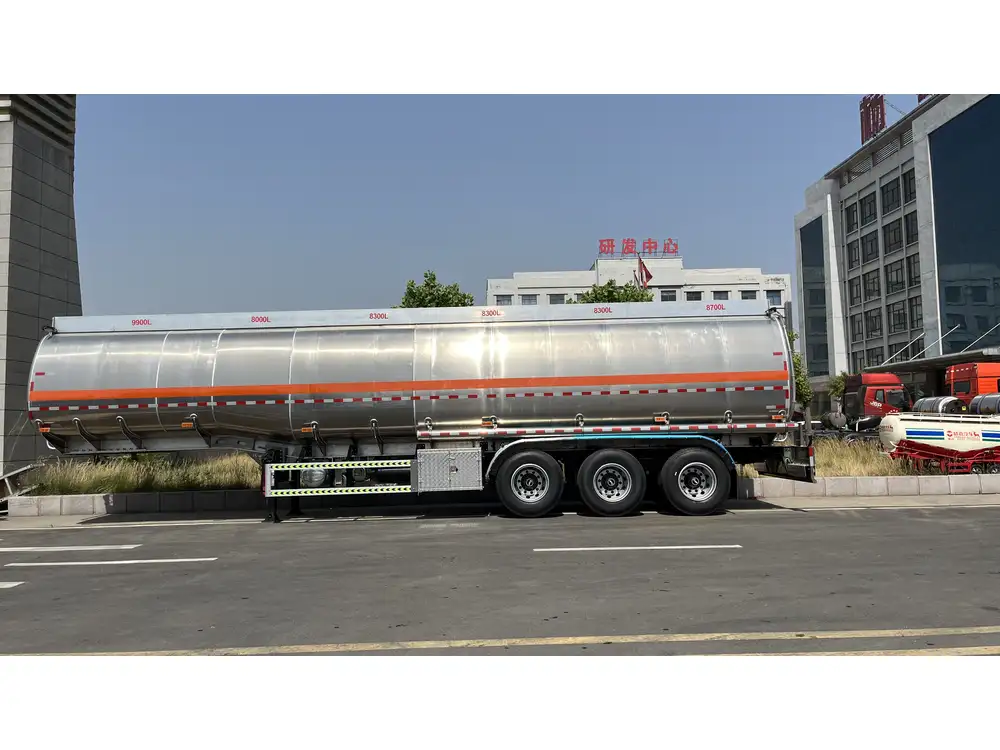
Maintenance and Compliance
Larger fuel systems may require more rigorous maintenance schedules to ensure safety and compliance with regulations, potentially increasing maintenance costs. Conversely, advanced fuel management systems can mitigate these expenses by preventing leaks and optimizing fuel usage.
Environmental Considerations
Fuel capacity and consumption have significant environmental implications. Sustainable practices in fuel management contribute to reducing the carbon footprint of transportation operations:
Emission Reduction
Optimizing fuel capacity and efficiency leads to lower fuel consumption, directly reducing greenhouse gas emissions. CarMax Trailer is committed to designing trailers that support greener transportation by minimizing fuel-based emissions.
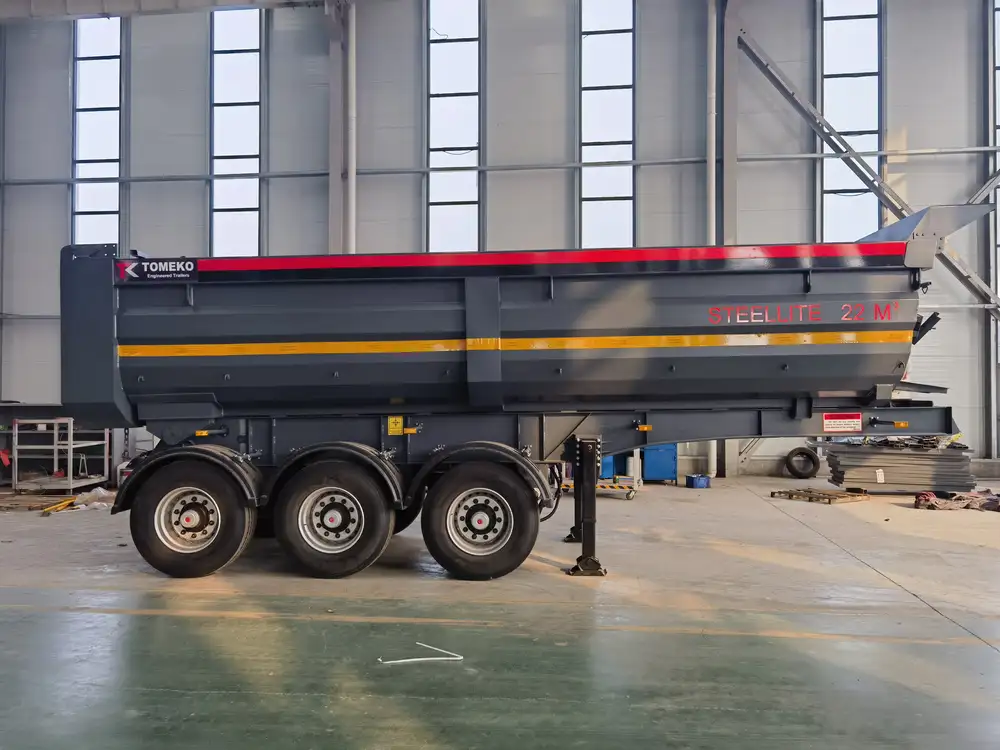
Alternative Fuels
Exploring and integrating alternative fuels like biodiesel or hydrogen can further decrease environmental impact. Our trailers are designed to accommodate these fuels, supporting the transition to more sustainable energy sources.
Recycling and Materials
Using recyclable materials in trailer construction not only reduces environmental impact but also aligns with global sustainability goals. CarMax Vehicle prioritizes eco-friendly materials and production processes in our manufacturing.
Customizing Fuel Capacities for Specific Needs
At CarMax Vehicle, we recognize that different industries have unique transportation requirements. Customizing fuel capacity ensures that each client can maximize the efficiency and effectiveness of their fleet. Here’s how we tailor our solutions:

Long-Haul Transportation
For long-haul routes, larger fuel capacities are essential to minimize refueling stops and maintain a consistent delivery schedule. Our semi-trailers for long-haul use come equipped with extended fuel tanks and advanced efficiency features.
Regional Distribution
In regional distribution, medium-sized fuel capacities strike a balance between range and payload. Our trailers designed for regional use offer flexible fuel capacities to suit varying distances and delivery frequencies.
Specialized Cargo
Transporting specialized cargo, such as hazardous materials or temperature-sensitive goods, requires trailers with specific fuel storage capabilities. We design customized fuel systems that comply with safety standards and ensure the integrity of the cargo.

Future Trends in Fuel Capacity and Semi-Trailer Design
The transportation industry is poised for significant advancements in fuel management and trailer design. CarMax Trailer is at the forefront of these innovations, anticipating and adapting to future trends:
Electrification and Hybrid Systems
The shift towards electric and hybrid propulsion systems will redefine fuel capacity requirements. Trailers will need to integrate battery storage solutions alongside traditional fuel systems, necessitating new design approaches.
Autonomous Driving Technologies
Autonomous trucks rely on precise fuel management systems to operate efficiently. Advanced sensors and AI-driven fuel optimization algorithms will play a crucial role in the future of semi-trailer fuel capacity and usage.
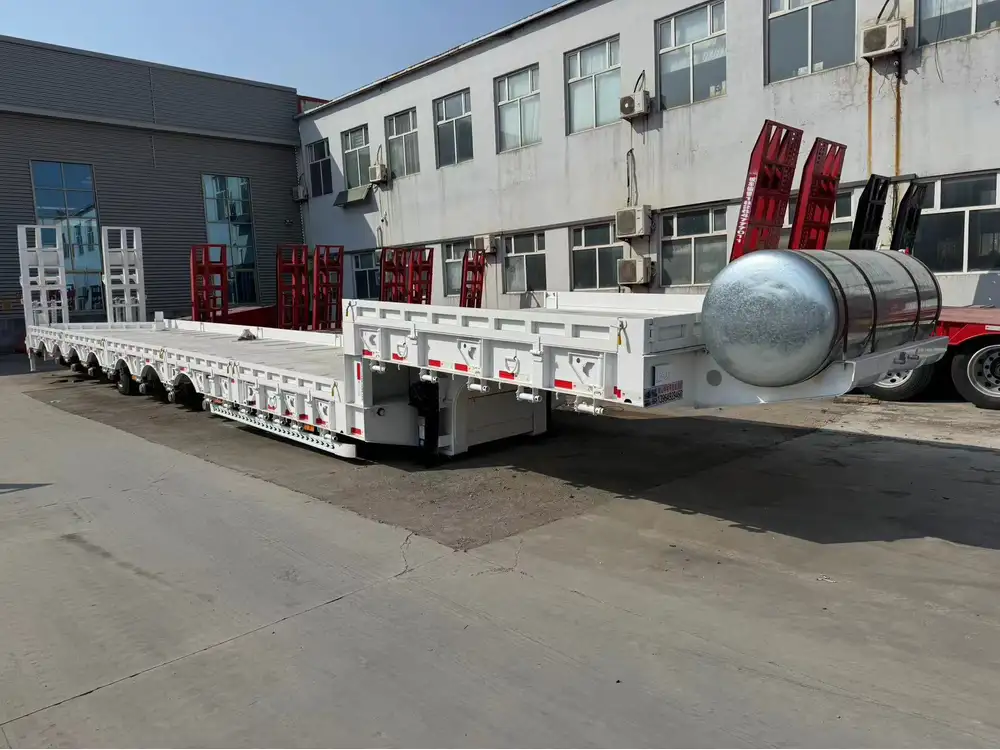
Sustainable Materials and Manufacturing
The push for sustainability will drive innovation in materials used for fuel tanks and trailers overall. Lightweight, durable, and recyclable materials will become standard, enhancing both fuel efficiency and environmental responsibility.
Choosing the Right Fuel Capacity for Your Fleet
Selecting the appropriate fuel capacity involves assessing multiple factors specific to your operation. CarMax Vehicle offers expert guidance to help you make informed decisions:
Assessing Route Lengths
Evaluate the typical distances your fleet covers daily and the availability of refueling stations along those routes. Longer routes may benefit from higher fuel capacities to reduce downtime.
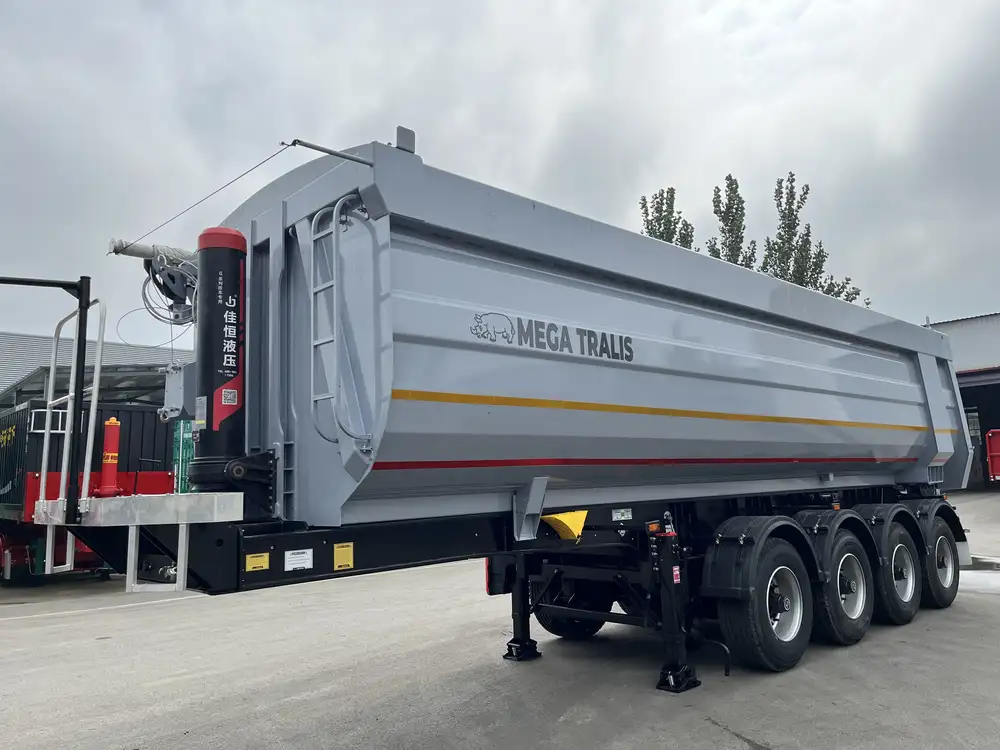
Evaluating Payload Requirements
Balance fuel capacity with payload needs. Ensure that additional fuel does not compromise the cargo weight capacity, maintaining compliance with transportation regulations.
Considering Fuel Types
Determine the types of fuel your fleet will use and select trailers that can safely and efficiently store and handle those fuels.
Budget Constraints
Factor in both initial investment and long-term operational costs. Our team can help you find the optimal balance between fuel capacity and overall cost-effectiveness.

Why Choose CarMax Trailer for Your Semi-Trailer Needs?
At CarMax Vehicle, we pride ourselves on delivering superior semi-trailers that cater to the nuanced needs of the transportation industry. Here’s what sets us apart:
Expertise and Innovation
With years of experience in trailer manufacturing, we leverage the latest technologies and design principles to create reliable, efficient, and customizable solutions.
Quality and Durability
Our trailers are built to withstand the demanding conditions of the transportation sector, ensuring longevity and minimal maintenance requirements.

Customer-Centric Approach
We work closely with our clients to understand their specific needs, providing tailored solutions that enhance their operational efficiency and profitability.
Comprehensive Support
From initial consultation to post-purchase support, CarMax Vehicle offers comprehensive services to ensure your fleet operates smoothly and effectively.
Conclusion
Fuel capacity is a fundamental aspect of semi-tanker design that significantly influences operational efficiency, cost management, and environmental sustainability. At CarMax Vehicle, we specialize in creating semi-trailers with optimized fuel capacities tailored to diverse transportation needs. By leveraging advanced technologies, adhering to stringent regulations, and focusing on sustainable practices, we ensure that our trailers deliver exceptional performance and reliability.
Investing in the right semi-trailer with appropriate fuel capacity is a strategic decision that can enhance your fleet’s productivity and reduce operational costs. Partner with CarMax Trailer to access industry-leading solutions that drive your transportation operations forward.

Frequently Asked Questions
1. What is the average fuel capacity of a standard semi-tanker trailer?
The average fuel capacity of a standard semi-tanker trailer ranges between 200 to 400 gallons, depending on the trailer design and intended use. At CarMax Vehicle, our trailers typically offer around 250 gallons to balance range and payload capacity effectively.
2. How does fuel capacity affect the overall payload of a semi-trailer?
Fuel adds significant weight to a semi-trailer, which can reduce the maximum payload the trailer can carry. It’s essential to balance fuel capacity with cargo weight to ensure compliance with transportation regulations and optimize load efficiency.

3. Can semi-trailers be customized to hold alternative fuels?
Yes, semi-trailers can be customized to accommodate alternative fuels such as biofuels or hydrogen. CarMax Vehicle designs trailers with specialized fuel storage systems to ensure safety and efficiency when handling these alternative energy sources.
4. What technologies are used to monitor fuel consumption in semi-trailers?
Advanced fuel monitoring systems and telematics are commonly used to track fuel levels, consumption rates, and detect potential leaks. These technologies provide real-time data, enabling fleet managers to optimize fuel usage and maintain operational efficiency.
5. How does fuel capacity impact the environmental footprint of a semi-trailer fleet?
Higher fuel capacities can lead to increased fuel consumption if not managed properly, resulting in a larger environmental footprint. However, optimizing fuel capacity and using fuel-efficient technologies can minimize emissions and support more sustainable transportation practices.



